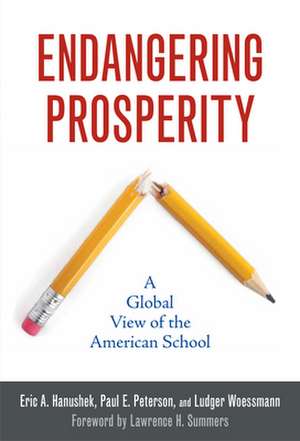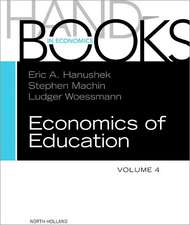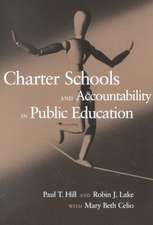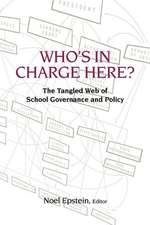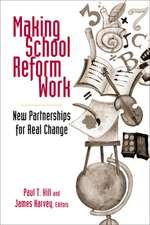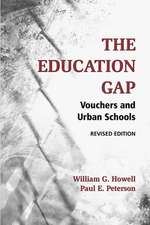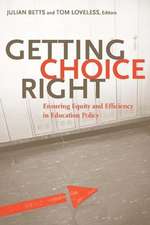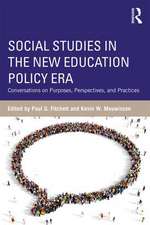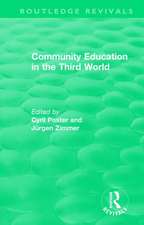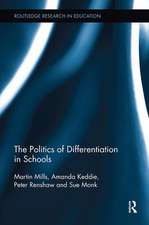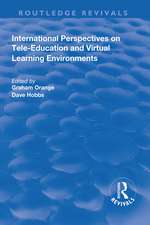Endangering Prosperity: A Global View of the American School
Autor Eric A. Hanushek, Paul E. Peterson, Ludger Woessmann Cuvânt înainte de Lawrence H. Summersen Limba Engleză Paperback – 19 iun 2013
The relative deficiencies of U.S. public schools are a serious concern to parents and policymakers. But they should be of concern to all Americans, as a globalizing world introduces new competition for talent, markets, capital, and opportunity. In Endangering Prosperity, a trio of experts on international education policy compares the performance of American schools against that of other nations. The net result is a mixed but largely disappointing picture that clearly shows where improvement is most needed. The authors' objective is not to explain the deep causes of past failures but to document how dramatically the U.S. school system has failed its students and its citizens. It is a wake-up call for structural reform. To move forward to a different and better future requires that we understand just how serious a situation America faces today.
For example, the authors consider the Programme for International Student Assessment (PISA), an international mathematics examination. America is stuck in the middle of average scores, barely beating out European countries whose national economies are in the red zone. U.S. performance as measured against stronger economies is even weaker—in total, 32 nations outperformed the United States. The authors also delve into comparative reading scores. A mere 31 percent of U.S. students in the class of 2011 could perform at the "proficient" level as measured by the National Assessment of Educational Progress (NAEP) program, compared with South Korea's result of 47 percent. And while some observers may downplay the significance of cross-globe comparisons, they should note that Canadian students are dramatically outpacing their U.S. counterparts as well.
Clearly something is wrong with this picture, and this book clearly explicates the costs of inaction. The time for incremental tweaking the system is long past—wider, deeper, and more courageous steps are needed, as this book amply demonstrates with accessible prose, supported with hard data that simply cannot be ignored.
For example, the authors consider the Programme for International Student Assessment (PISA), an international mathematics examination. America is stuck in the middle of average scores, barely beating out European countries whose national economies are in the red zone. U.S. performance as measured against stronger economies is even weaker—in total, 32 nations outperformed the United States. The authors also delve into comparative reading scores. A mere 31 percent of U.S. students in the class of 2011 could perform at the "proficient" level as measured by the National Assessment of Educational Progress (NAEP) program, compared with South Korea's result of 47 percent. And while some observers may downplay the significance of cross-globe comparisons, they should note that Canadian students are dramatically outpacing their U.S. counterparts as well.
Clearly something is wrong with this picture, and this book clearly explicates the costs of inaction. The time for incremental tweaking the system is long past—wider, deeper, and more courageous steps are needed, as this book amply demonstrates with accessible prose, supported with hard data that simply cannot be ignored.
Preț: 225.53 lei
Nou
Puncte Express: 338
Preț estimativ în valută:
43.16€ • 44.89$ • 35.63£
43.16€ • 44.89$ • 35.63£
Carte tipărită la comandă
Livrare economică 14-28 aprilie
Preluare comenzi: 021 569.72.76
Specificații
ISBN-13: 9780815703730
ISBN-10: 0815703732
Pagini: 147
Ilustrații: illustrations
Dimensiuni: 152 x 229 x 13 mm
Greutate: 0.27 kg
Ediția:New.
Editura: Brookings Institution Press
Colecția Brookings Institution Press
ISBN-10: 0815703732
Pagini: 147
Ilustrații: illustrations
Dimensiuni: 152 x 229 x 13 mm
Greutate: 0.27 kg
Ediția:New.
Editura: Brookings Institution Press
Colecția Brookings Institution Press
Notă biografică
Eric Hanushek is the Paul and Jean Hanna Senior Fellow in Education at the Hoover Institution, Stanford University.
Paul E. Peterson is the Henry Lee Shattuck Professor of Government and director of the Program on Education Policy and Governance at Harvard University and a senior fellow at the Hoover Institution.
Ludger Woessmann is a professor of economics at the University of Munich.
Paul E. Peterson is the Henry Lee Shattuck Professor of Government and director of the Program on Education Policy and Governance at Harvard University and a senior fellow at the Hoover Institution.
Ludger Woessmann is a professor of economics at the University of Munich.
Descriere
The relative deficiencies of U.S. public schools are a serious concern to parents and policymakers. But they should be of concern to all Americans, as a globalizing world introduces new competition for talent, markets, capital, and opportunity. In Endangering Prosperity, a trio of experts on international education policy compares the performance of American schools against that of other nations. The net result is a mixed but largely disappointing picture that clearly shows where improvement is most needed. The authors' objective is not to explain the deep causes of past failures but to document how dramatically the U.S. school system has failed its students and its citizens. It is a wake-up call for structural reform. To move forward to a different and better future requires that we understand just how serious a situation America faces today.
For example, the authors consider the Programme for International Student Assessment (PISA), an international mathematics examination. America is stuck in the middle of average scores, barely beating out European countries whose national economies are in the red zone. U.S. performance as measured against stronger economies is even weaker—in total, 32 nations outperformed the United States. The authors also delve into comparative reading scores. A mere 31 percent of U.S. students in the class of 2011 could perform at the "proficient" level as measured by the National Assessment of Educational Progress (NAEP) program, compared with South Korea's result of 47 percent. And while some observers may downplay the significance of cross-globe comparisons, they should note that Canadian students are dramatically outpacing their U.S. counterparts as well.
Clearly something is wrong with this picture, and this book clearly explicates the costs of inaction. The time for incremental tweaking the system is long past—wider, deeper, and more courageous steps are needed, as this book amply demonstrates with accessibl
For example, the authors consider the Programme for International Student Assessment (PISA), an international mathematics examination. America is stuck in the middle of average scores, barely beating out European countries whose national economies are in the red zone. U.S. performance as measured against stronger economies is even weaker—in total, 32 nations outperformed the United States. The authors also delve into comparative reading scores. A mere 31 percent of U.S. students in the class of 2011 could perform at the "proficient" level as measured by the National Assessment of Educational Progress (NAEP) program, compared with South Korea's result of 47 percent. And while some observers may downplay the significance of cross-globe comparisons, they should note that Canadian students are dramatically outpacing their U.S. counterparts as well.
Clearly something is wrong with this picture, and this book clearly explicates the costs of inaction. The time for incremental tweaking the system is long past—wider, deeper, and more courageous steps are needed, as this book amply demonstrates with accessibl
